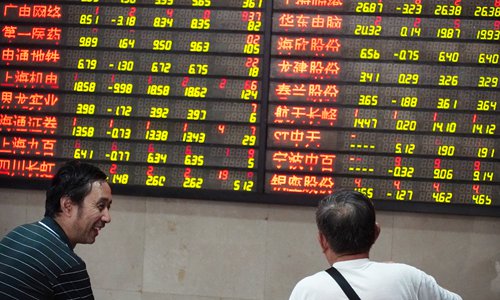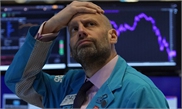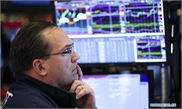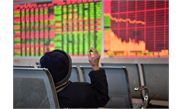
Individual investors follow the stock market at a bourse in Nanjing, East China's Jiangsu Province on Monday. Photo: IC
People buy water, food and toilet paper at a store in Los Angeles, California on Saturday, as they have begun stockpiling essentials amid fears of dwindling supplies during a possible COVID-19 coronavirus epidemic. Photo: AFP
China's stock market opened higher on Wednesday as investors get boosted by a global overnight rally. The benchmark Shanghai Composite Index edged up 1.94 percent at opening, while the Nasdaq-style ChiNext hiked 2.56 percent.
Stocks related to gold, aviation and consumer electronics led gains in the A-share market. As of 9:42am, some auto stocks have also surged by the daily limit of 10 percent.
Across the Asian market, Japan's Nikkei 225 soared 6 percent as of 9:51 on Wednesday.
The trend is in line with a global market surge on the hopes that the US Federal Reserve will offer unlimited market support and that US Congress will approve a stimulus package on Wednesday to blunt the economic impact of COVID-19.
US stocks registered their best gains in recent days on Tuesday. The Dow Jones Industrial Average surged more than 11 percent, its biggest one-day gain since 1933. The S&P 500 also saw its biggest daily gain since 2008, rising more than 9 percent. The tech-heavy Nasdaq Composite rose 557.18 points, or 8.1 percent, to 7,417.86.
Despite impressive gains, all three indexes remain below their readings at the beginning of the year. By close on Tuesday, the Dow Jones had plunged 27.45 percent from the beginning of the year. The S&P 500 and the tech-heavy Nasdaq Composite had plummeted 24.25 percent and 17.33 percent, respectively.
Over the past 10 days, the key circuit breaker was triggered on the US stock market four times. Bucking the trend, China's A-share market has remained relatively insulated from the impact of the US market, which has led to heated discussion that the domestic capital market could be a "safe heaven" for global investors.
"It is too early to say US stocks have stopped sinking. The indexes will likely to fluctuate in the future if the bailout plan runs into snags. But the global market should treasure such a respite," Yang Delong, chief economist at the Shenzhen-based First Seafront Fund Management Co, told the Global Times on Wednesday.
Some Chinese economists doubt the US' unlimited capital injections will be able to stabilize the country's capital market and save its flattening economy.
Ren Zeping, prominent analyst and chief economist with Evergrande, wrote in a recent article that China should consider dumping dollar-denominated assets and instead invest in natural gas, fossil fuels, gold, agricultural products, iron ore and stocks in overseas high-tech companies.
"There is no need for China to pay for the US' excessive consumption and debt financing. We don't need to hold flailing US debts and dollars. We don't need $3 trillion in foreign reserves," Ren said.
Global Times



